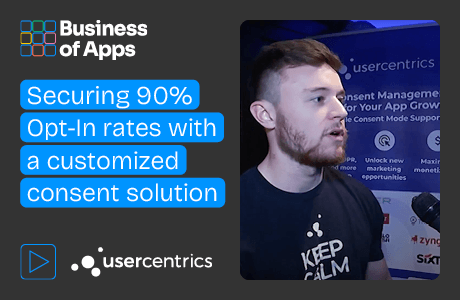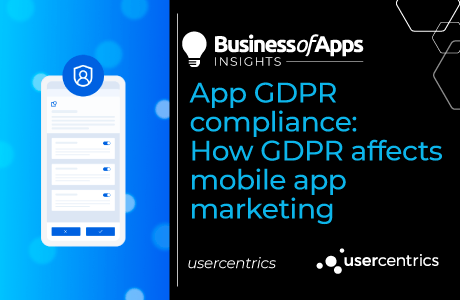In the cutthroat world of app marketing, where user acquisition costs spiral and regulatory compliance can derail entire campaigns, one fundamental shift is quietly revolutionizing how successful companies approach growth: the transition from data-hoarding to privacy-led marketing.
In this episode of App Talk, we came face to face with Margarita Sovertokina, International Sales Account Manager at Usercentrics, who’s been at the forefront of consent management since the industry was still treating privacy as an afterthought rather than a competitive advantage.
What started as regulatory necessity has evolved into something more powerful — a marketing philosophy that doesn’t just comply with laws, but actively improves user engagement, retention, and trust. The companies embracing this shift aren’t just staying compliant, they’re outperforming competitors who still operate like it’s 2015.
But perhaps more importantly, Sovertokina’s insights reveal something fundamental about the future of app growth — the age of invasive tracking is ending, and the winners will be those who adapt fastest.
The trust framework that changes everything
While most app companies treat consent banners as legal obstacles to minimize, Usercentrics built something far more strategic. Their platform doesn’t just collect consent; it transforms privacy compliance into a brand differentiator and user experience enhancement.
“It’s not about collecting all the data there, but collecting the relevant data to be more human,” Margarita explains. “Not to try to track our users and trick them at the end… but really try to understand who our users are, what they like, what they would like to see.”
This human-first approach has uncovered insights that traditional acquisition-focused thinking misses entirely:
- Timing matters more than content: Gaming apps see higher consent rates when they ask after the first level, when users are already engaged, rather than immediately upon install.
- Platform consistency builds trust: Users notice when companies respect privacy on web but ignore it on mobile — cross-device consent sharing creates a cohesive brand experience.
- Transparency drives conversion: Companies that clearly explain why they need data and how it benefits users see better consent rates than those using legal jargon or dark patterns.
The implications are profound. Every privacy interaction — from banner design to data usage explanations — either builds or erodes the foundation of user relationships.
Privacy-first marketing: Usercentrics’ insights
Source: App Promotion Summit
The Netflix revelation
Perhaps the most powerful example to emerge from Margarita’s work is treating privacy like Netflix treats content discovery. Instead of trying to collect everything about everyone, successful companies ask users directly what they want.
“The great example is when you sign up for Netflix,” Margarita notes. “Netflix is asking you: Hey, tell us, who are you? What do you like? And then based on this, we will show you the things that you like.”
This user-centric approach transforms privacy compliance from defensive to offensive strategy by leveraging first-party data richness, where direct user input provides deeper insights than third-party tracking ever could. Users who voluntarily share their preferences are more likely to remain engaged long-term, and when they feel respected and understood, they’re significantly less likely to delete apps or block communications.
The shift from stealth data collection to transparent value exchange represents a fundamental evolution in how apps build sustainable user relationships.
When privacy becomes competitive advantage
The most counterintuitive breakthrough for Margarita’s team has been using privacy as a differentiator that drives business results. Companies implementing privacy-led strategies report increased engagement and retention rates.
“I’ve seen some very interesting research that when you do this in an engaging and upfront way, it actually increases engagement and has an impact on retention,” Margarita reveals.
This represents a paradigm shift in growth strategy where trust becomes the primary conversion driver, as users are more likely to engage with brands that respect their choices from the start.
By focusing on users who actively consent, companies eliminate acquisition waste on uninterested audiences while positioning themselves to attract privacy-conscious users who often represent higher-value customer segments.
In other words, the companies winning in privacy-first marketing are leveraging compliance as a growth accelerator.
The cross-platform imperative nobody saw coming
While the industry focuses on individual platform compliance, Margarita and her team have built something more comprehensive: a unified privacy experience that spans web, mobile, connected TV, and even connected cars.
“If you really want to build this trustworthy environment, you have to do it on all the platforms and be consistent,” she observes. “To show that we are here and we respect you, we respect your choices.”
This unified approach solves the perpetual problem of fragmented user experiences by ensuring privacy practices become part of brand identity across all touchpoints. This also future-proofs companies against regulations that will inevitably expand to new platforms.
What this means for apps
The insights from Margarita’s work translate into several strategic imperatives for app companies:
Stop treating privacy as a necessary evil
The companies that will thrive treat privacy compliance as brand building and user experience optimization, not legal overhead.
Platform-specific execution with unified strategy
Your consent approach should feel native to each platform while maintaining consistent brand values and user respect.
Invest in relationship building, not data hoarding
Collecting relevant data from engaged users beats tracking everything from disinterested ones.
Make privacy part of your product story
The future belongs to apps that can explain their data practices as clearly as their feature benefits.
Embrace transparency as a competitive moat
In a world of privacy-conscious consumers, being genuinely transparent about data usage becomes a differentiator.
In an app ecosystem where user trust directly impacts retention and lifetime value, understanding how to build rather than exploit user relationships becomes business-critical. The difference between privacy-led and privacy-compliant marketing is the difference between sustainable growth and regulatory whack-a-mole.
Recorded at App Promotion Summit London 2025, this interview is part of our ongoing App Talk series, where we dive deep into the strategies behind today’s most successful apps. Explore all our App Talk interviews here.











